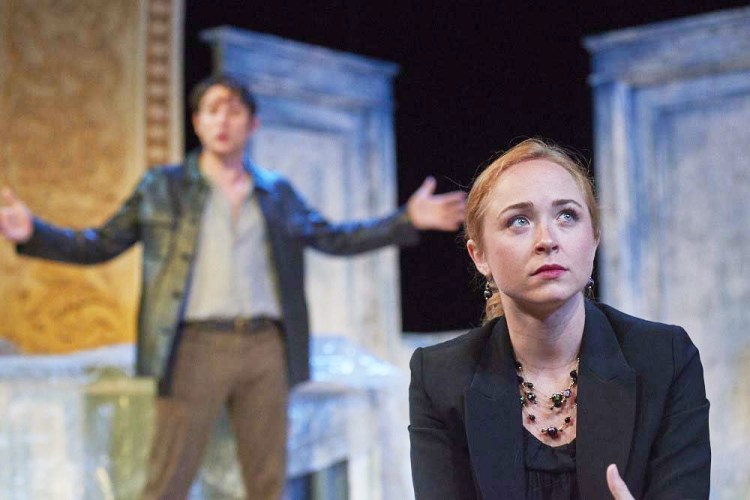Is what we think we know about our parents’ past even close to the real story?
Richard Greenberg’s “Three Days of Rain,” the first production of the Theater at Monmouth’s 48th season, takes an unusual form in telling the story of two generations of family and friends and the questionable lore that passes between them.
The first act takes place in 1995 and introduces us to two adult siblings and a friend who share a history through the professional and personal relationships between their parents. They are gathered for the reading of a will, and it becomes clear that there are plenty of unresolved issues underlying the question of who will inherit a famous house that one of their parents designed.
The audience is tested on its memory skills, as the second act has the same actors portraying their parents 35 years earlier. Secrets are revealed that give new perspective on why things turned out as they did in Act 1.
The reverse chronology does make the show a bit of a puzzle. But witty and, at times, moving dialogue flesh out enough details in this thought-provoking and enjoyable production to make it worth the effort to follow the narrative links.

Travis Johnson and Meghan Leathers in “Three Days of Rain.”
Kate Bergstrom directs with a feel for the poignant elements behind the clever and sometimes comical storytelling and frames the emotional states of the characters with much restless movement.
The downtown New York City loft set by Patrick Lynch establishes itself as a space of refuge and rebirth for the evolving characters with only a few references, in the music and dialogue, to mark broader cultural changes.
On opening night, each of the three performers in this production met the challenges of playing two related but distinct characters.
Travis Johnson plays both the troubled son, Walker, and his brilliant but impaired father, Ned. Seeking to uncover knowledge of his laconic dad, Johnson’s character in Act 1 establishes his unease, addressing the audience directly in monologue and his sister Nan through awkward conversation. Evincing both vulnerability and a snarky erudition, he insists on knowing if there really is anything behind an ambiguous legacy. In the father’s role, Johnson reveals this dad’s own strengths and vulnerabilities in a sympathetic performance suggesting that his children may have firmer roots than they think.

Travis Johnson, Meghan Leathers and Brad Wilson each play two characters in “Threes Days of Rain.”
Meghan Leathers, as sister Nan and mother Lina, gives the former a sense of being ever more tightly wound while her portrayal of the latter moves in the other direction. The emotive span of her two performances is particularly striking. Her Lina embodies a compelling, if unsteady “muse” for the other, more cerebral characters.
Bradley Wilson, as son Pip and his dad Theo, completes the two threesomes with words of reason and stability, though his stress levels are tested. His epic rant in Act 1 earned show-stopping applause from the crowd. Amid the struggles of the others, his characters’ outbursts, strangely, suggest resolution.
This well-done little 1997 play should more than hold its own among the grander classics to follow in repertory this summer at Monmouth.
Steve Feeney is a freelance writer who lives in Portland.
Send questions/comments to the editors.



Comments are no longer available on this story